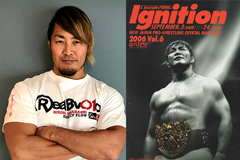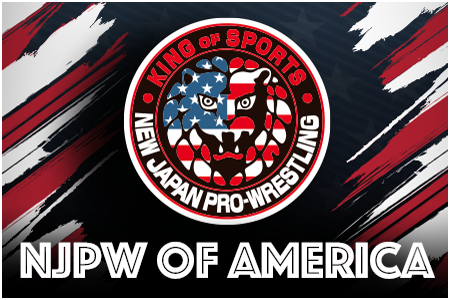Hiroshi Tanahashi’s life story can now be told in this series of autobiographical interviews, available for the first time in English!

<–Ace’s HIGH #52: High Fly Flow
Ace’s HIGH #54 Coming May 5!->
–Last time we talked about the 2006 G1. In the end it was Hiroyoshi Tenzan who won the tournament that year, his third career win after defeating All Japan Pro-Wrestling’s Satoshi Kojima. Tenzan then moved to challenge you at Ryogoku on October 9. You had a contract signing at the Chiba event on September 8, where you promised that ‘as champion, I will sell out this venue within the year’.
Tanahashi: This was a tough period for us business wise, but Chiba seemed a particularly bad market. When I first won the title, I would go with our promotional staff to the different towns to promote these cards. We would be in these smaller towns saying ‘let’s aim for 500 people’. This was before COVID, not restricted attendance. 500 was the goal; we were averaging around 300 people.
–We were running much smaller buildings then.
Tanahashi: Right. So it was a real thrill to have those conversations with the staff when we came back to a place, and they’d tell me ‘we did 50 more than last time’, ‘100 more this time’, or what have you. But the truth was things didn’t happen right away. 2006 was still really tough. I wouldn’t say we really saw the benefits until around ’09, ’10. That’s when things started to pick up, and we got that 500 mark. Then it’d be ‘OK, next time, 1000’.
–It took a while to really pull through.
Tanahashi: So when I said what I did in Chiba, I don’t think anyone really expected we would sell the place out within the year, but that’s the resolve that I had, and it was my duty to say it, I think.
–So winning that first title really changed you, do you think?
Tanahashi: I’d say I really changed my outlook right before I won the title. Before then, I always kind of felt… not like it was someone else’s problem, but that somebody would be able to lead the way while I worked up from underneath. It wasn’t really until that Hokkaido tour that I looked at that locker room and thought ‘hey, am I that somebody?’. I think just in terms of visually, image wise, my age at the time, it really fell into place that I had to be the guy to step up. I really felt the responsibility from that point on.
–And when you had that belt in your hands, that’s responsibility right there.
Tanahashi: Maybe this might sound like I’m full of myself, but your average wrestler won’t go around saying ‘I’m the guy, I’m the ace’. Maybe when I said I would lead the way back then, it might have rubbed a few the wrong way, even. But when you say that, and it starts getting about, starts getting acknowledged, then it’s really off to the races. At the end of the day, if the product isn’t over, we can’t get new stars over. So my thinking was ‘OK, let’s get us to the point where we can make somebody’. My job was to take this garden full of rocks and garbage and work the soil. Then, lo and behold, in 2012 we had a little rainfall, heheh.
–The rain fall from the Rainmaker.
Tanahashi: We had a bumper crop from there, if you forgive me stretching the analogy (laughs). But that work was tough. You have this idea of everyone fussing over you as champion, but I had more stress, more mental issues than ever before. When you get that belt, that’s when the real work starts. Peaks and valleys, sure, but then it was just valley after valley.
–After your first defence, and for a while afterward, you were booed pretty heavily. Later you’d write that you didn’t fit the traditional image of a ‘Strong Style’ wrestler, and that fans showing their displeasure at that turned into boos. At the time, it wasn’t what you’d expected to happen.
Tanahashi: Right. Maybe you can chalk this up to tone deafness, and maybe I didn’t know, but I’d always felt my whole life that there wasn’t a single person who disliked me. My parents were so kind and supportive, I was popular at school. So when I was getting these boos it was a real shock to the system, like I couldn’t believe that people didn’t like me. And because I realised it late, it was difficult to address.
–You weren’t ready for it.
Tanahashi: You have to remember, I was being booed, but I was positioned as a babyface. So I’m tagging with the other guys in hontai, and when I get tagged in, I’m the only guy getting booed. That’s a tough situation for the other guys to deal with, too. Around that point, Keiji Muto, who was in AJPW at the time, he said to me ‘Hey, Tana, don’t let the business break you’. All I’d given my life to up to that point was doing everything I could for this business. So I really didn’t know what to say in response to something like that.
–Did the other hontai wrestlers talk to you about it?
Tanahashi: No, not really. I didn’t have a mentor around to really advise me, and nobody was exactly going to reach out to me. There’s a lot of jealousy in the business, and I think there were probably more than a few people who were happy to see me fall on my face. It was really, really lonely at the top. But the one guy who actually stopped my heart was breaking was our sound designer, Endo-san.
–A real veteran staff member.
Tanahashi: My style is really built around taking all this punishment and then finding a way to get the job done. Endo-san told me ‘there’s value to that, that’s important. You’re like Inoki now’. For a guy who’d seen matches in venues every night for God knows how many years to say that meant the world to me. In a very real way, Endo-san saved NJPW (laughs).
–It took you a long time, but you earned the fan’s trust and respect in the end.
Tanahashi: I persisted, toughed it out, and eventually those fans that hated me caved, I think? (laughs) I think the most important thing is I didn’t lose faith in myself. There was a lot about NJPW back then that was very stuck in its ways, very inflexible, but if it stayed that way, it would be in this nosedive out of existence. I stuck to my guns, kept that conviction and kept wrestling my way. Thinking back about it, those tough times really furthered me as a wrestler and as a person.





